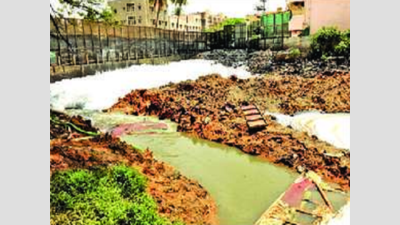- News
- City News
- bengaluru News
- After Kolar, Hoskote to get treated water from Bengaluru
Trending
This story is from December 23, 2018
After Kolar, Hoskote to get treated water from Bengaluru
At a time when many villagers continue to be concerned about the quality of water being pumped from Bengaluru city to Kolar lakes under the controversial Koramangala-Challaghatta (KC) Valley project, the minor irrigation department is going ahead with another similar plan.

Under the KC Valley project, water from city lakes has to be pumped to Kolar
BENGALURU: At a time when many villagers continue to be concerned about the quality of water being pumped from Bengaluru city to Kolar lakes under the controversial Koramangala-Challaghatta (KC) Valley project, the minor irrigation department is going ahead with another similar plan. It envisages supplying treated water from Vengaiahnakere lake in KR Puram to 30 lakes/tanks in Hoskote taluk, Bengaluru Rural.
Rajanna, assistant engineer with the department, said they have recently floated pre-qualification tenders inviting bidders for a detailed survey, investigation and design of civil and electromechanical works. “The water will be released from a sewage treatment plant in Vengaiahnakere. The bids will be opened in the last week of February,” he added.
In July this year, froth was noticed in Lakshmisagar lake in Kolar district after water was released into it under the KC Valley project. This led to many villagers staging a protest and the minor irrigation department stopping the pumping of water. The flow was resumed only after the high court issued strict directions on maintaining the water quality.
R Anjaneya Reddy, president, Shashwatha Neeravari Horata Samiti, expressed fear over the Hoskote project. “The government and its agencies seem to have not learnt lessons from the Kolar incident. The KC Valley project created problems because it was implemented without a proper baseline survey, and environment and social impact assessment,” he said.
A farmer activist from Hoskote, on condition of anonymity, said the government claims that it’s treating sewage water from Bengaluru. “However, various studies have proved that Bengaluru lakes contain 25% of effluents, which can’t be cleansed with secondary treatment. Only water that undergoes tertiary treatment is safe,” he added.
No plan of tertiary treatment
A senior official from the minor irrigation department, however, said they have no plan of tertiary treatment at present as it would be a costly affair. “If the government takes a call on the issue, we are ready to upgrade to tertiary treatment,” he added.
Rajanna, assistant engineer with the department, said they have recently floated pre-qualification tenders inviting bidders for a detailed survey, investigation and design of civil and electromechanical works. “The water will be released from a sewage treatment plant in Vengaiahnakere. The bids will be opened in the last week of February,” he added.
In July this year, froth was noticed in Lakshmisagar lake in Kolar district after water was released into it under the KC Valley project. This led to many villagers staging a protest and the minor irrigation department stopping the pumping of water. The flow was resumed only after the high court issued strict directions on maintaining the water quality.
R Anjaneya Reddy, president, Shashwatha Neeravari Horata Samiti, expressed fear over the Hoskote project. “The government and its agencies seem to have not learnt lessons from the Kolar incident. The KC Valley project created problems because it was implemented without a proper baseline survey, and environment and social impact assessment,” he said.
Admitting that taluks in Bengaluru Rural, Kolar and Chikkaballapura districts are parched, he said that doesn’t mean poor quality water can be pumped to fill lakes. “Hopefully, the government will be cautious in implementing the Hoskote project,” he added.
A farmer activist from Hoskote, on condition of anonymity, said the government claims that it’s treating sewage water from Bengaluru. “However, various studies have proved that Bengaluru lakes contain 25% of effluents, which can’t be cleansed with secondary treatment. Only water that undergoes tertiary treatment is safe,” he added.
No plan of tertiary treatment
A senior official from the minor irrigation department, however, said they have no plan of tertiary treatment at present as it would be a costly affair. “If the government takes a call on the issue, we are ready to upgrade to tertiary treatment,” he added.
End of Article
FOLLOW US ON SOCIAL MEDIA










